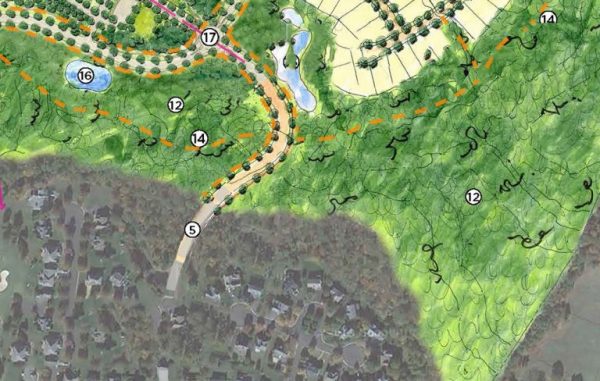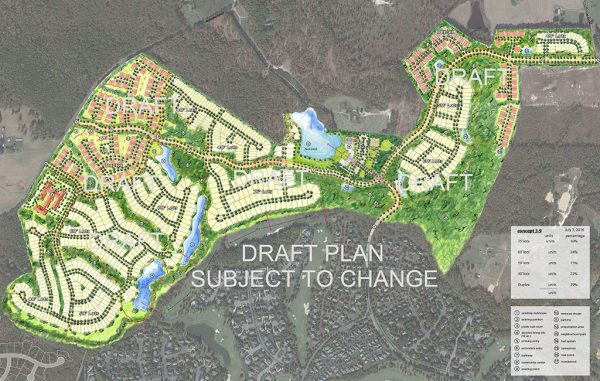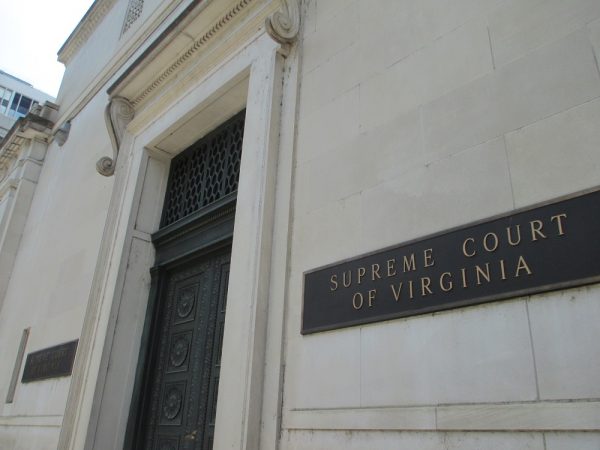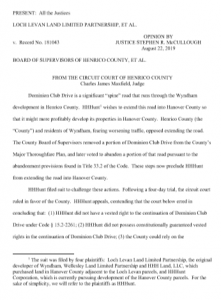The state’s highest court has weighed in on a years-long dispute between Henrico County and one of its biggest residential developers.
The Supreme Court of Virginia issued an opinion Thursday affirming a lower court’s ruling that the county was within its rights when it eliminated a stretch of road that HHHunt had intended to use to connect Wyndham, which it developed decades ago, with another community it is planning next door in Hanover County.
HHHunt, which wants to develop a 55-and-up age-restricted community on 366 acres that includes land currently used by Hunting Hawk Golf Club, had appealed the circuit court ruling handed down last year to the Supreme Court, which heard arguments in June.
Preston Lloyd, a Williams Mullen attorney who represented HHHunt in the appeal along with colleague Joseph Pope, issued a statement Thursday in response to the ruling.
“As counsel to HHHunt, we are disappointed in today’s result, which diminishes access not only to this particular road but to all the rights of way in Virginia that serve future expansions,” Lloyd said.
“However, we respect the decision of the Supreme Court of Virginia and will work with our clients as they evaluate options for protecting infrastructure investments in their communities moving forward.”
Deputy County Attorney J.T. “Tom” Tokarz, who presented Henrico’s arguments to the court, said in an email that the county “appreciates the thoroughness of the Court’s opinion and its careful consideration of the issues in the case.”
“Although they were on different sides in this case, the County and HHHunt have worked together on many high quality developments in Henrico County,” he said. “The County looks forward to doing so in the future.”
Road to nowhere?

The extension had been planned to connect Wyndham with another HHHunt project across the county line in Hanover. (Courtesy HHHunt)
HHHunt had planned to extend Dominion Club Drive from Wyndham to connect with the Hanover development, but after submitting plans to Hanover in 2016, Henrico removed the portion of road from its future roads plan, in response to concerns from Wyndham residents and Henrico staff about increased traffic and effects on public safety.
The removal prompted a pair of lawsuits from the developer, which maintained the road had been long-reflected in county plans and its removal would be detrimental to the Hanover development, which has yet to go before the Hanover Planning Commission. A four-day trial went in the county’s favor, prompting HHHunt to appeal to the Supreme Court.
In the opinion issued Thursday and written by Justice Stephen McCullough, the court agreed with the circuit court’s finding that the county did not violate HHHunt’s rights to extend the road, contending that any rights to do so expired after five years of inactivity, according to state statutes and case law.
“Like the circuit court, we conclude that HHHunt’s right to develop Dominion Club Drive was limited to five years,” the opinion states. Noting a plat in question was recorded in 1992, the court added, “Because HHHunt did not complete the road in five years, its statutory rights to complete this road had expired.”
The court said HHHunt could have taken another route to secure the future road’s right-of-way, either by going ahead and building it or by dedicating the right-of-way when it recorded a plat for an adjacent section of Wyndham.
Instead, the court said, “HHHunt chose a specific course of action, which was to proceed incrementally and to record separate plats for distinct segments of Dominion Club Drive. That course of action triggered specific statutory protections and foreclosed others.”
While the incremental approach allowed HHHunt to avoid spending money to complete the road, the court said “…it lost the indefinite protection offered by (state statute).”
“When HHHunt obtained the rezoning for Wyndham in 1989, it plainly expected to extend Dominion Club Drive into Hanover County at some indefinite point in the future,” the opinion states. “Its legal right to do so, however, expired five years after recording the plat for the final stretch of road that would accomplish this objective.”
‘Proper concerns’

A site plan of the Hanover development. (Courtesy HHHunt)
HHHunt also had argued that the county’s removal of the road was “arbitrary and capricious” and in response to public outcry, but the court disagreed, reiterating the lower court’s decision.
“The circuit court heard evidence over the course of four days. It concluded that ‘public opposition, safety concerns, and intersection failure are all proper concerns for the board’s decision, and they cannot be seen as arbitrary and capricious,” the opinion states.
“Certainly, no present public necessity exists for the continuation of such a ‘road.’ No residents or existing businesses will be stranded.” While it acknowledged HHHunt sees the road as a convenience, the court said, “…that convenience must be weighed alongside the detriment of increased congestion in a residential subdivision and the prospect of still more congestion in the future.
“Second, although HHHunt dismissively portrays opposition from Wyndham residents to the extension of Dominion Club Drive as groundless and irrational, residents’ worries were certainly relevant to the Board’s decision,” the court said.
It’s unclear how the decision may affect HHHunt’s plans for its Hanover development. Attempts to reach HHHunt Communities President Kim Kacani for comment were unsuccessful Thursday.
In a statement disseminated by The Wyndham Foundation, the Wyndham Homeowners Association called the court’s decision “a victory for the safety, health and welfare of the Wyndham community.”
“The State Supreme Court decision brings to an end a decade-long battle. We would like to thank Deputy County Attorney Tom Tokarz and Assistant County Attorney John Gilbody and the County’s Attorney’s Office for their diligence and efforts in this case.”
The state’s highest court has weighed in on a years-long dispute between Henrico County and one of its biggest residential developers.
The Supreme Court of Virginia issued an opinion Thursday affirming a lower court’s ruling that the county was within its rights when it eliminated a stretch of road that HHHunt had intended to use to connect Wyndham, which it developed decades ago, with another community it is planning next door in Hanover County.
HHHunt, which wants to develop a 55-and-up age-restricted community on 366 acres that includes land currently used by Hunting Hawk Golf Club, had appealed the circuit court ruling handed down last year to the Supreme Court, which heard arguments in June.
Preston Lloyd, a Williams Mullen attorney who represented HHHunt in the appeal along with colleague Joseph Pope, issued a statement Thursday in response to the ruling.
“As counsel to HHHunt, we are disappointed in today’s result, which diminishes access not only to this particular road but to all the rights of way in Virginia that serve future expansions,” Lloyd said.
“However, we respect the decision of the Supreme Court of Virginia and will work with our clients as they evaluate options for protecting infrastructure investments in their communities moving forward.”
Deputy County Attorney J.T. “Tom” Tokarz, who presented Henrico’s arguments to the court, said in an email that the county “appreciates the thoroughness of the Court’s opinion and its careful consideration of the issues in the case.”
“Although they were on different sides in this case, the County and HHHunt have worked together on many high quality developments in Henrico County,” he said. “The County looks forward to doing so in the future.”
Road to nowhere?

The extension had been planned to connect Wyndham with another HHHunt project across the county line in Hanover. (Courtesy HHHunt)
HHHunt had planned to extend Dominion Club Drive from Wyndham to connect with the Hanover development, but after submitting plans to Hanover in 2016, Henrico removed the portion of road from its future roads plan, in response to concerns from Wyndham residents and Henrico staff about increased traffic and effects on public safety.
The removal prompted a pair of lawsuits from the developer, which maintained the road had been long-reflected in county plans and its removal would be detrimental to the Hanover development, which has yet to go before the Hanover Planning Commission. A four-day trial went in the county’s favor, prompting HHHunt to appeal to the Supreme Court.
In the opinion issued Thursday and written by Justice Stephen McCullough, the court agreed with the circuit court’s finding that the county did not violate HHHunt’s rights to extend the road, contending that any rights to do so expired after five years of inactivity, according to state statutes and case law.
“Like the circuit court, we conclude that HHHunt’s right to develop Dominion Club Drive was limited to five years,” the opinion states. Noting a plat in question was recorded in 1992, the court added, “Because HHHunt did not complete the road in five years, its statutory rights to complete this road had expired.”
The court said HHHunt could have taken another route to secure the future road’s right-of-way, either by going ahead and building it or by dedicating the right-of-way when it recorded a plat for an adjacent section of Wyndham.
Instead, the court said, “HHHunt chose a specific course of action, which was to proceed incrementally and to record separate plats for distinct segments of Dominion Club Drive. That course of action triggered specific statutory protections and foreclosed others.”
While the incremental approach allowed HHHunt to avoid spending money to complete the road, the court said “…it lost the indefinite protection offered by (state statute).”
“When HHHunt obtained the rezoning for Wyndham in 1989, it plainly expected to extend Dominion Club Drive into Hanover County at some indefinite point in the future,” the opinion states. “Its legal right to do so, however, expired five years after recording the plat for the final stretch of road that would accomplish this objective.”
‘Proper concerns’

A site plan of the Hanover development. (Courtesy HHHunt)
HHHunt also had argued that the county’s removal of the road was “arbitrary and capricious” and in response to public outcry, but the court disagreed, reiterating the lower court’s decision.
“The circuit court heard evidence over the course of four days. It concluded that ‘public opposition, safety concerns, and intersection failure are all proper concerns for the board’s decision, and they cannot be seen as arbitrary and capricious,” the opinion states.
“Certainly, no present public necessity exists for the continuation of such a ‘road.’ No residents or existing businesses will be stranded.” While it acknowledged HHHunt sees the road as a convenience, the court said, “…that convenience must be weighed alongside the detriment of increased congestion in a residential subdivision and the prospect of still more congestion in the future.
“Second, although HHHunt dismissively portrays opposition from Wyndham residents to the extension of Dominion Club Drive as groundless and irrational, residents’ worries were certainly relevant to the Board’s decision,” the court said.
It’s unclear how the decision may affect HHHunt’s plans for its Hanover development. Attempts to reach HHHunt Communities President Kim Kacani for comment were unsuccessful Thursday.
In a statement disseminated by The Wyndham Foundation, the Wyndham Homeowners Association called the court’s decision “a victory for the safety, health and welfare of the Wyndham community.”
“The State Supreme Court decision brings to an end a decade-long battle. We would like to thank Deputy County Attorney Tom Tokarz and Assistant County Attorney John Gilbody and the County’s Attorney’s Office for their diligence and efforts in this case.”




